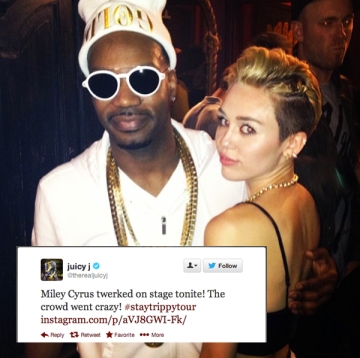The controversy behind the dance “twerking” is a subject I am trying to avoid in writing Welcome to Black Excellence. Like the countless trends, ideas, and styles before it, Black America influences the rest of America.
On Twitter, I discovered that rapper/producer Juicy J’s $50,000 scholarship contest had chosen a winner. The judging criteria was based on the twerking abilities of the contestants. I remember when Juicy J first announced this twerking scholarship; the announcement made me feel uncomfortable. Uncomfortable as a black man, uncomfortable as a scholar, uncomfortable as a Christian, and uncomfortable as a father of a beautiful baby girl—I was uncomfortable. Thus, I did not follow up on the contestants’ video submissions. To be clear, I will not sit behind this MacBook and pretend that I have never enjoyed or observed a twerking video. Twerking has been popular for years in the Black community mainly by young adults and teenagers. Additionally, I did attend a historically black college and university, thus I am quite familiar with the dancing trend. Some of the smartest girls I went to school with or knew twerked, and did it effectively. However, with the popularity of the Twerk Team—a pair of African American females based out of Georgia— and pop singer Miley Cyrus, twerking has gotten out of control. How do I know this? Anytime that old people, mass media, and little white kids begin to refer to a Black trend, it’s out of control. Likewise, high school students twerking in the hallways and through YouTube videos has dramatically increased over the years.
Thus, when I discovered that the scholarship recipient was featured on professor, scholar, writer, and MSNBC host Melissa Harris-Perry’s show, I wondered why. What could a big-booty, twerking, semi-educated college student bring to such an educated, cultural, and politically-driven program? Certainly nothing worth watching; I was wrong, very wrong. Meet Kimari Carter, a senior at the University of Texas-Austin, majoring in African (maybe cultural) studies. And any presumption I placed on her before hearing her story or seeing her was inaccurate. On the contrary, she is an intellectual with a purpose who likes to have fun, and has studied twerking through an academic perspective.
Observing this interview and doing some “light” research on Kimari’s story illuminated a bigger truth: No matter what people think or say about you, none of that matters. Your self-belief outweighs the scrutiny and prejudice that others place on you. Kimari admitted that she formally stripped (i.e., exotic dancing) to pay her college tuition and living expenses. Thanks to popular movies like Lisa Raye’s “The Players Club” circa 1998, pretty college girls dancing to pay for college has become cliche especially in the South. Imagine the rumors and assumptions placed on an attractive girl enrolled in college with a flawed past. The brilliance and persistence embedded in Kimari’s spirit pushed her to use that negativity as fuel. She turned her pain into inspiration and hard work. She turned her pain and adversity into opportunity. She didn’t allow herself to be polarized by her classmates and peers. That is an excellent trait and quality towards reaching excellence. She became very active in various school organizations and she held leadership roles. The way she articulates her beliefs, her motivation for participating in the twerking contest, and her studies abroad should inspire us all. Finally, she earned $50,000 in cash through legal, articulate, creative means. How many of us wouldn’t dance (i.e., or do something) for $50K? I would like to remind everyone that Black scholars and those (i.e., of any race) committed to excellence do not judge people, because none of us—as human beings— is perfect. I always say: I don’t judge people; I judge products and businesses. God is the only one able to judge the former. (Sidenote: A deeper issue that I might dig into into my book will be the stigma attached to strong-willed attractive Black women. There appears to be an over-sexualization of these women especially if they can dance.)
Share this article with a friend. Follow me @Blackscholaronl via Twitter. And continue to strive for personal and community excellence. #BlackExcellence
Kimari’s scholarship video is here.

